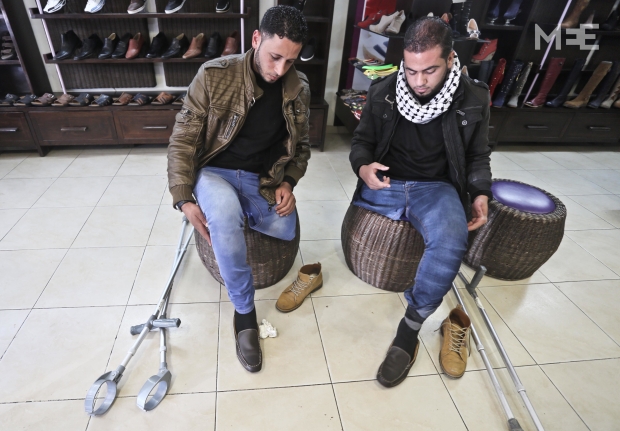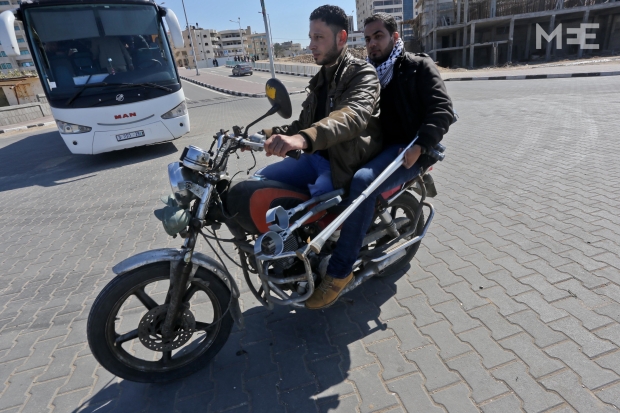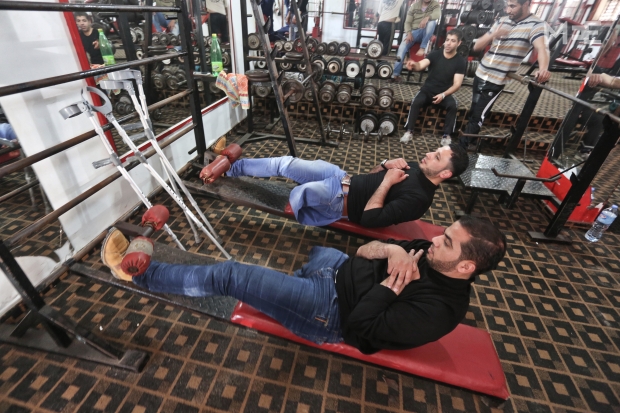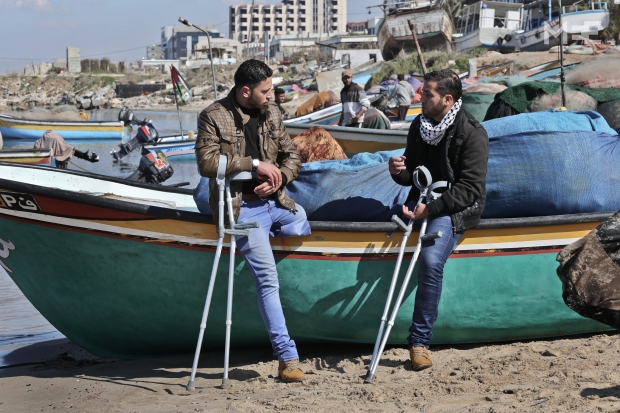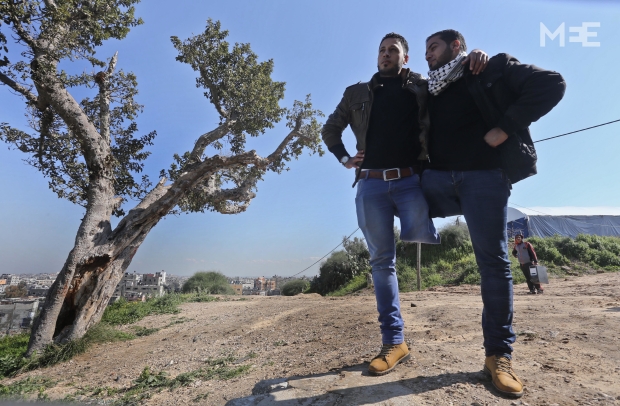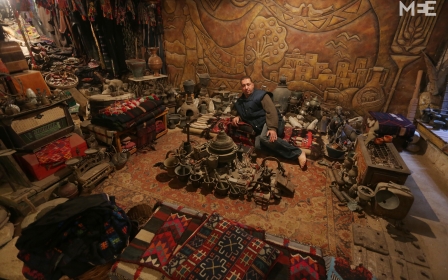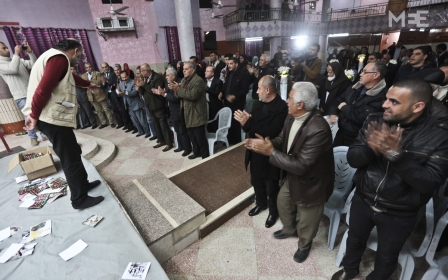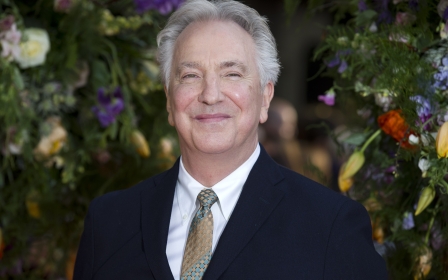'My other leg is over there': Injured pals share shoes and life in Gaza
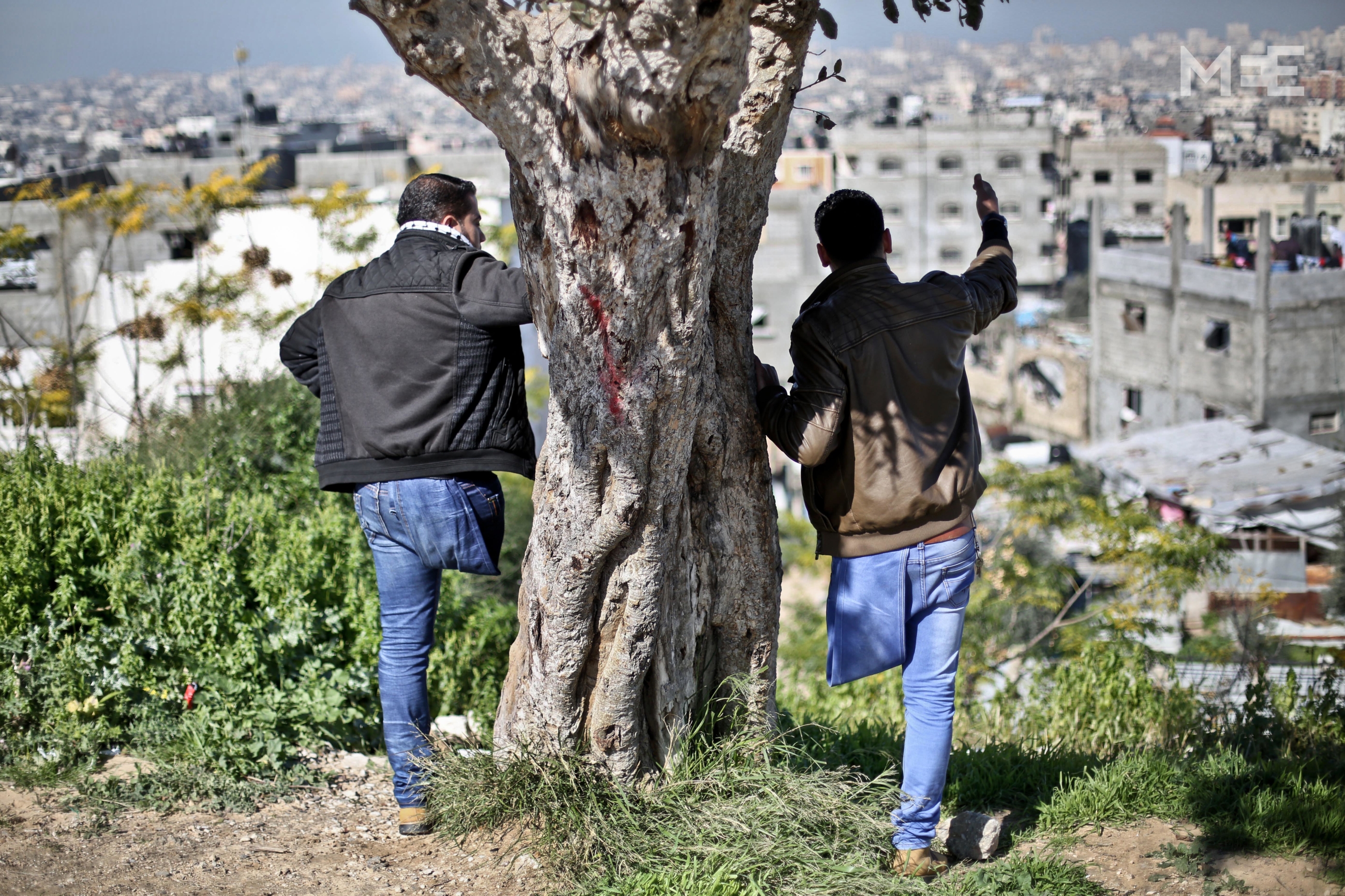
GAZA STRIP - Spring is in the air, and it is time for Adli Ebied and Mansour al-Qerem to buy a new pair of shoes. They climb off the motorcycle they share outside one of Gaza's local shoe shops, walk into the middle of the store aided by their crutches, and happily begin trying on the latest styles.
It is not long before they decide on a pair whose cost they will split between them. One takes the left shoe, while the other takes the right.
Adli, 24, and Mansour, 26, share a special affinity: they both lost a leg during the Israeli attacks on Gaza in 2011.
Although they were not together when each of them sustained their injuries, since recovering in hospital and during rehabilitation their friendship has developed into a unique bond. Day by day they have gained strength from each other and share an appreciation of simply being alive.
Fortunately the friends share the same tastes in shoes, making buying a new pair an exciting task for them both. This could potentially be a problem when it comes to shoe sizes, but the two even have the same-sized feet - an added bonus.
Despite Gaza's challenging circumstances, they enjoy eating, shopping, relaxing, running errands and riding their motorcycle together.
Though from different economic backgrounds, their friendship began at school, has continued through adulthood and is now stronger than ever due to the similar circumstances that life has thrown their way.
“A perfect moment to sense real friendship can just be in a shoe shop, where Mansour and I immediately agree on the same taste and type of shoe,” Adli says smiling.
Like many young men Adli and Mansour are full of energy, notwithstanding the loss of a leg due to injuries each has sustained. But their spirits are high and their sense of humour causes one to barely notice their physical challenges.
Each has learned to live in a new version of themselves minus a limb, one relying on his left leg and the other on his right. It might be expected that being physically challenged would create inactivity or insecurity in getting through life's everyday activities, but not for these two friends.
They still go shopping, enjoy hanging out in Gaza’s parks, stroll along the beach and take a motorcycle ride together on routine errands.
The friendship makes it easy for them both to forget that each has lost a leg. “My other leg is over there,” smiles Adli, pointing to Mansour. Mansour smiles back, responding: “Yes, and that’s my other leg (pointing to Adli) and I can’t even think of going anywhere without it, or without Adli.”
“Our friendship is stronger after the shared pain we have endured,” says Mansour, with a wide smile.
“Together we are much better than before we were injured,” says Adli.
Adli and Mansour both live in Shejayeh, west Gaza City, an area that was severely hit during the last Israeli war on the blockaded strip of land. The pair like to walk through Gaza’s fishing hub from the far eastern border fence with Israel to the seafront in the far west.
“We are like everybody else. We do our daily activities and not one day passes without us spending it together,” says Mansour.
Left for dead
Both Adli and Mansour have challenged the Arabic saying that says: “One hand on its own can’t clap.” In defiance of all the odds Gaza presents, Mansour knows that one leg is enough for him to pursue his life in a joyful way.
Adli was injured in March 2011, when Israeli shells fell on residential houses and on a group of Palestinian youths who were playing football and watching a football match near the Al Wadiya Dairy in Nazaz Street. When the shocking incident took place, Adli fearlessly acted as a first-aid attendant to the injured, but was soon injured himself when a second strike hit the same location.
He looks disturbed as he recalls the events of that day and as his friend Mansour sits silently listening to the details of that day again; the day when Adli was brought to the hospital in a coma with medical crews expressing sadness and certainty that nothing could be done for him, even pronouncing Adli dead as his broken body was transferred to the morgue.
Everyone sits silently listening to his harrowing experience of being surrounded by the dead in the morgue, still conscious. “It was freezing cold in there, but I could neither speak, nor move,” he recalls.
Adli explains how his father, Hassan Ebied, arrived at the hospital's morgue for a final goodbye to his son. “I felt the warmth of my father’s hand, and clutched on tight, in that cold morgue.”
On realising that life was still present, Adli’s father, Hassan, screamed out: “My son is alive, my son is alive!”
His friend Mansour came to visit him in the hospital and said: “Take my legs, my dear friend, but recover, be well,” not knowing that a few months later in the same year, he would also lose a leg.
To recover fully, Adli went through several operations in hospitals in different Arab states. After losing his older brother in the war, he is now the oldest son, and must take care of his family. Due to his moral obligations and family priorities, he could no longer afford a university education.
“My dream now is to have a job that can get me and my friend Mansour to the same good place,” he smiles as they sit side by side leaning against a fishing boat.
Dreams continue
Joking with Adli, Mansour pauses for a moment. “So is that the only dream? Tell him what you told me?” he says with a shy smile, followed by laugher.
“Despite the pain, my other hope is to marry a good woman and build my own family,” he says.
Before this extra dream can be realised, he needs a prosthesis, so that he can walk unaided.
Mansour lost his left leg during an air strike on Shejayeh in August 2011, in what seemed to be a targeted strike on resistance fighters that were allegedly nearby. This was five months after his friend Adli suffered the same fate.
His younger brother actually witnessed the bombing, but had no idea that Mansour was in the same location and was one of its victims. As a result, he ran home telling his family: “Someone has been killed.” His mother, oblivious of Mansour’s injuries, replied: “May God bring patience to the victim’s mother.”
Some hours later, she was finally informed that the victim was actually her own son, Mansour, who had lost a leg, some fingers and sustained shrapnel to his head.
“The only positive part about being injured is how it empowered my friendship with Adli,” he says as he walks under a sycamore tree on al-Mintar Hill, an area overlooking Gaza City.
“We share everything and split expenses - after all, we are one soul, with two bodies,” he says as he points down to different parts of Gaza, observing its growth and the changes he and Adli have together witnessed since childhood.
The entire city has changed. New generations are born into the ever-changing world of Gaza which, despite all of its adversity, still retains a serene beauty. Despite the turmoil, Gazans try not to allow an atmosphere of defeat to take hold. In Shejayeh people’s mode of resistance is to stay, stand firm and just try to enjoy life, despite the odds that seem stacked against them.
In spite of his injuries Mansour still wanted to get married, and now that he is married, he says he feels so much joy with his wife, Neda.
Neda is expecting a baby in four months, and is happy that her husband is able to have the support he needs through his friend Adli.
“Through pain, we are able to find joy, by sharing all we have, and continuing to care for one another,” says Mansour.
This sharing extends to the motorcycle: Mansour handles the gears and Adli steers - everyone in the streets who watches them fly by is amazed at their level of co-operation.
“When we share a motorcycle ride, I feel like a whole human body with nothing missing,” Mansour smiles as they head off back to Shejayeh with the sunset behind them.
Middle East Eye propose une couverture et une analyse indépendantes et incomparables du Moyen-Orient, de l’Afrique du Nord et d’autres régions du monde. Pour en savoir plus sur la reprise de ce contenu et les frais qui s’appliquent, veuillez remplir ce formulaire [en anglais]. Pour en savoir plus sur MEE, cliquez ici [en anglais].


